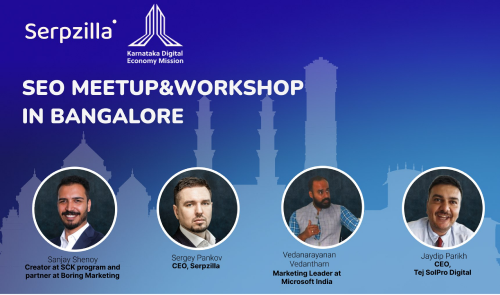No, SEO is not dead.
There we said it.
That’s Serpzilla’s official answer.
In black and white.
Now that we have that out of the way, let’s understand the reasons why SEO is pronounced dead every few days. And why it’s going to remain alive and kicking for a long time to come.
How did the claim of “SEO is dead” originate?
Jeremy Schoemaker – of “shoemoney” fame – first reported the death of SEO in his now famous post way back in 2005. As per him, Jason Calcanis proclaimed SEO as dead in the SES convention at San Jose earlier that year.
Source: https://www.shoemoney.com/2005/12/10/seo-is-dead
By that time, Google had already introduced anti-spam updates such as Florida, Cassandra and Austin. There were also concerns that ads would gain prominence in the SERPs, and organic results would become too competitive and insignificant as a result.
Therefore, the idea that SEO is dead quickly took root in the minds of people in the industry. Since then, it has been constantly reinforced by the erroneous opinions, assumptions and conclusions of various groups of people.
Who, you ask.
Webmasters stuck in the past
You cannot solve today’s problems with yesterday’s methods.
But not many are ready to accept it. Webmasters used to easy strategies such as keyword stuffing, exact-match domains, buying hundreds of irrelevant links, and even using black-hat spam means such as code injection have been repeatedly dealt huge shocks by Google’s crack down on these methods. When that happened, their pages disappeared from the SERPs, never to return anymore.
For them, SEO will never be the same anymore.
Small business owners who grew fast
Business owners often saw SEO as a magic pill in a new domain they never understood – Google. With inherent impatience, no organizational knowledge of tech or marketing and unwise assumptions, they hired snake oil SEO salespeople who showed quick results initially.
Eventually, as Google kept rolling out updates like Panda, Penguin and Pigeon, they saw their traffic fall like a rock and stay down, despite doubling down on budgets or taking corrective measures.
This is why we at Serpzilla place such a high importance on managing client expectations from SEO campaigns. SEO is a slow process, with results appearing only after 3 to 6 months at a minimum. If you are a business owner trying out SEO and not willing to wait, then SEO is certainly dead for you.
Traditional marketers and advertisers
In the early days of SEO, CMOs and marketing heads didn’t even consider it to be a proper marketing strategy. They saw digital marketing, SEO and social media as a techy fad. At the same time, they also saw the disparity between the time SEO took to deliver leads and sales, compared to PPC. Further, they could never really understand the point of frequent Google updates and saw these as tech gimmicks.
And so, many marketers considered SEO to be an ineffective marketing strategy. They failed to understand that SEO is a means to sales, not a channel for sales. SEO helps at every stage of the entire marketing and sales funnel. That includes demand generation, brand awareness, lead generation, conversion, sales, customer loyalty, advocacy – everything!
However, the immediate goal of SEO is to drive targeted traffic to your website. What you do with the visitor, how you interact with them, what actions you get them to take, is up to the Marketing, Sales and Customer Service departments in your organization.
SEOs themselves
There are two kinds of SEOs who say SEO is dead.
The first category consists of ones who are inexperienced, who believe everything that Google says, and the ones that don’t want to spend time and effort performing experiments. OK, granted, some may not be aware of the possibilities, but the point is they don’t A/B test their SEO campaigns.
For these people, it becomes very difficult to beat Google because they don’t even believe it can be done. They simply keep doing what they’ve always done. As our friend Rohan Ayyar says, if you don’t keep yourself updated, SEO will turn into a zombie and eat your braaaaiiiins.
The second category consists of digital marketers who live and breathe SEO, who are open to experimentation, who believe they never know everything, and who take Google’s words with a pinch of salt. They evolve their SEO strategies in step with Google.
More importantly, they beat the first category very easily and consistently. Their clients beat the competition every time.
So, what’s the evidence that SEO is not dead?
Oh, there’s tons.
Theoretical
As long as search engines exist in the form of algorithms – not just exclusively like Google, but also on top of other platforms such as YouTube, Amazon, etc. – you’ll be able to optimize your pages accordingly. Algorithms and bots rely on certain signals and factors to index and rank websites or profile pages. All you have to do is:
- Form hypotheses on what will make your page rank better.
- Test out those hypotheses.
- Make changes accordingly.
Practical
SEO speaks for itself. And it speaks volumes. For every expert claiming SEO is dead, there are a hundred others sharing case studies upon case studies of client successes. If SEO is dead, why are businesses falling over themselves to rank at the top?
In business, numbers speak louder than words. And profits scream.
Personal experience
If you’re reading this article, you probably googled “is seo dead?” and found it at the top of the SERPs. The proof of the pudding is in the eating, they say.
If you’re still not convinced, you can rely on empirical evidence from your own experience by asking yourself a few simple questions. Here’s a flowchart to assist you:
Source: https://ahrefs.com/blog/is-seo-dead/
What’s your verdict?
By now you’ve definitely formed an opinion of your own on the state of SEO. SEO has evolved much over the years and it will keep evolving. That makes it very much alive and kicking. If you want to consistently rank on top of Google, you need to follow an integrated SEO strategy consisting of:
- Smart link building
- Keyword research
- Competitor research
- Conversion Rate Optimization (CRO)
- Selling your SEO services
All this is certainly not easy, but it is doable indeed. Long live SEO!









